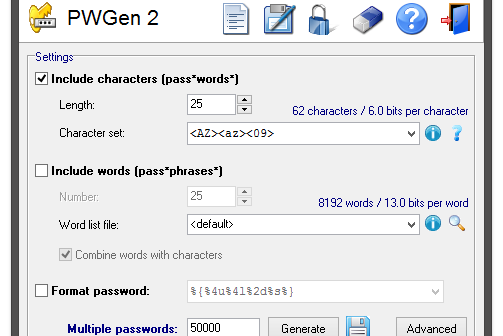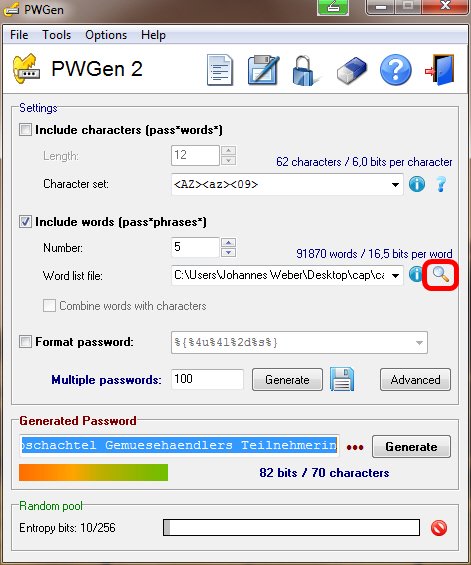
I checked everything from Fedora to Mandriva, and it looks like you shouldn’t have any issues installing it. If not, it’s very likely to be in your default repositories. The tool ‘pwgen’ may well be installed by default. The tool I use to do this is known as pwgen.
#PWGEN MAN PASSWORD#
That means when I need to login to an account I’ll often just hit the button to recover my password and then use a new password entirely. This means I’ve had to generate quite a few passwords. I don’t do a whole lot of password sharing and remembering. I’ve also been working on a new computer that’s just meant for testing. I’ve been working on getting this site up and running. I’ve been working on a router for the past few weeks. This being Linux, there are surely other ways to accomplish this task, but this is the method that I use. It is a simple command, but comes in surprisingly handy. The licensing status of the program was unclear.In this article, I will tell you how I use pwgen to generate random passwords. Was somewhat of a hack, and thus hard to maintain, and because It was rewritten from scratch by Theodore Ts'o because the original program Later extensively modified by Olaf Titz, Jim Lynch, and others. y, -symbols Include at least one special character in the password. It provides less secure passwords toĪllow system administrators to not have to worry with random passwordsĪccidentally contain offensive substrings. v, -no-vowels Generate random passwords that do not contain vowels or numbers that Guaranteed that users will simply write the password on a piece of Only be used for machine passwords, since otherwise it's almost

s, -secure Generate completely random, hard-to-memorize passwords. This option, make sure the attacker can not obtain a copy of the file.Īlso, note that the name of the file may be easily available from the The passwords generated using this option are not very random. This pattern can be modified by the options in Table 1 to produce an easier to remember password, but. It is based on the traditional password advice, providing eight character strings for passwords that include lower- and uppercase letters, numerals, and special characters. Ie: pwgen -H ~/your_favorite.mp3#your givesĪ list of possibles passwords for your pop3 account, and you can PWGen is one of the oldest password generators for Linux 1. If you remember the file, seed, and pwgen's options used. It will allow you to compute the same password later, H, -sha1= /path/to/file Will use the sha1's hash of given file and the optional seed to create n, -numerals Include at least one number in the password. This defaults to a screenful if passwords are C Print the generated passwords in columns.

c, -capitalize Include at least one capital letter in the password. General use of this option is not recommended. It may be useful for users who have bad vision, but in Passwords significantly, and as such reduces the quality of the B, -ambiguous Don't use characters that could be confused by the user when printed, a, -alt-phonics This option doesn't do anything special it is present only forīackwards compatibility. A, -no-capitalize Don't bother to include any capital letters in the generated passwords. 1 Print the generated passwords one per line. OPTIONS -0, -no-numerals Don't include numbers in the generated passwords. Will only generate one password, as this tends to be much more convenientĬompatible with previous versions of this program. When standard output (stdout) is not a tty, This prevents someone fromīeing able to "shoulder surf" the user's chosen password. Password, and then quickly erase the screen. Will display a screenful of passwords, allowing the user to pick a single Is a tty device or a pipe to another program. Its default behavior differs depending on whether the standard output To be used both interactively, and in shell scripts. Randomly generated passwords have a tendency to be written down,Īnd are subject to being compromised in that fashion. Option should not be used in places where the password could be attacked

Human-memorable passwordsĪre never going to be as secure as completely completely random

Humans, while being as secure as possible. Program generates passwords which are designed to be easily memorized by Human-memorable passwords are never going to be as secure as completely completely random passwords.
#PWGEN MAN MANUAL#
Command to display pwgen manual in Linux: $ man 1 pwgen NAMEpwgen - generate pronounceable passwords SYNOPSIS pwgen OPTION pwlength numpw DESCRIPTION The pwgen program generates passwords which are designed to be easily memorized by humans, while being as secure as possible.


 0 kommentar(er)
0 kommentar(er)
